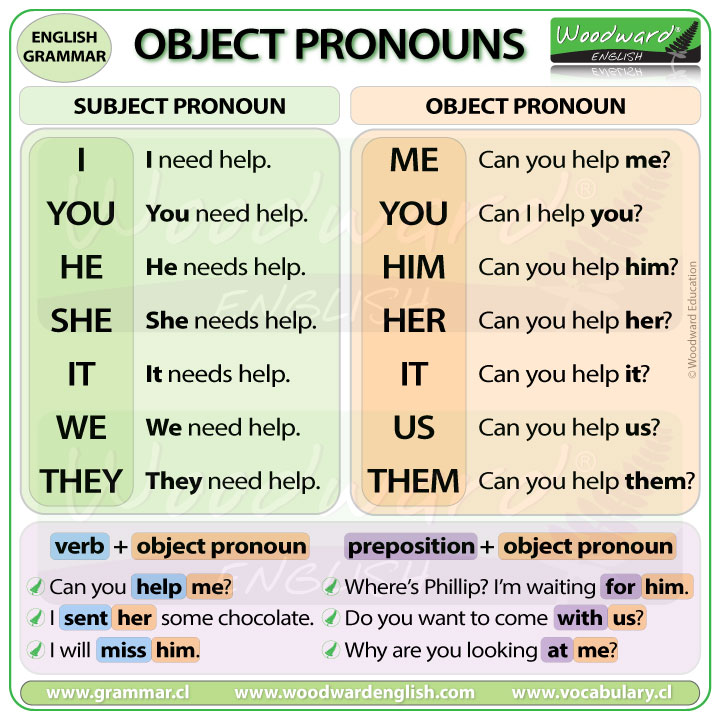Object Pronouns in English
- I need help.
This sentence is about the person (I). I is subject of this sentence. I is a subject pronoun.
- I need help. Can you help me?
Me is the person receiving the help. Me is the object of this action. Me is an object pronoun.
We cannot say:
- I need help. Can you help I? ❌
This is because the object pronoun often has a different form compared to the subject pronoun.
Look at these sentences and questions:
- I need help. Can you help me?
(I is the subject pronoun – ME is the object pronoun) - You need help. Can I help you? *
(The subject and object pronouns for YOU have the same form) - He needs help. Can you help him?
(HE is the subject pronoun – HIM is the object pronoun) - She needs help. Can you help her?
(SHE is the subject pronoun – HER is the object pronoun) - It needs help. Can you help it? *
(The subject and object pronouns for IT have the same form) - We need help. Can you help us?
(WE is the subject pronoun – US is the object pronoun) - They need help. Can you help them?
(THEY is the subject pronoun – THEM is the object pronoun)
* Notice how YOU and IT do not change in form. The subject and object pronouns have the same form for YOU and IT.
Now look at this sentence:
- I sent her some flowers.
Do we know who HER refers to? No. It could be my friend, my sister, my mother, my wife, we don’t know.
We use object pronouns when we have already specified or mentioned the person we are talking about. We know who the person is.
Why did we use HER in this sentence? Probably because we have already talked about the person. For example:
- It’s Angelica’s birthday today. I sent her some flowers.
Now we know the flowers are for Angelica because I mentioned her name before.
I sent HER … = I sent Angelica …
The person receiving the flowers is Angelica.
BUT we don’t repeat the name immediately if it has just been mentioned:
- It’s Angelica’s birthday today. I sent Angelica some flowers.
This sounds repetitive!
That is why we use object pronouns … to avoid repetition.
Compare these questions:
- Can you tell John I will miss John?
You can see that saying John twice in this question sounds repetitive.
How can we make this sound more natural? By using an object pronoun.
- Can you tell John I will miss him?
We used the object pronoun him in the second question to avoid sounding repetitive.
Compare these two sentences.
- Emma sent me some flowers.
- I sent her some chocolate.
Who is giving the flowers in the first sentence?
Emma is giving the flowers.
Who is receiving the flowers in the first sentence?
ME … I am receiving the flowers
Who is giving the chocolate in the second sentence?
I am giving the chocolate.
Who is receiving the chocolate in the second sentence?
HER … which means SHE or EMMA is receiving the chocolate.
Object Pronouns – Word Order Introduction
You may have noticed in all the previous examples that the object pronoun goes after the verb.
- Can you help me?
- I sent her some chocolate.
- I will miss him.
- You can take them (Them may refer to people or things)
Sometimes object pronouns go after a preposition.
- Where’s Phillip? I’m waiting for him.
- Do you want to come with us?
- Why are you looking at me?
- Listen to her.
We will learn more about the word order of direct and indirect object pronouns in another lesson.
The Imperative + Object pronouns
Object pronouns are frequently used with The Imperative.
The imperative is mostly used to give orders or instructions.
- Help us!
- Stop him!
- Listen to me!
- Cut them into small pieces.
- Give me the ball.
We will learn more about the imperative in another lesson.
Object pronouns exercise
Let’s practice. Complete the blank spaces with the correct object pronoun.
- Mary is early. Can you tell ___ to wait please?
- We’re making pizza. Do you want to help ___?
- Your brother is noisy. Tell ___ to be quiet.
- Can you tell ___ the truth? I need to know.
- I have a new book. I want to read ___ now.
- I have many books. I read ___ at night.
- You’re busy so I will call ___ later.
- Jack and Jill had an accident. I took ___ to hospital.
The answers to this exercise appear in the video.
Object Pronouns Summary Chart

I hope you found this English lesson about Object Pronouns useful.
If you did please subscribe so you know when we create new lessons to help you improve your English.
Have an awesome day!
